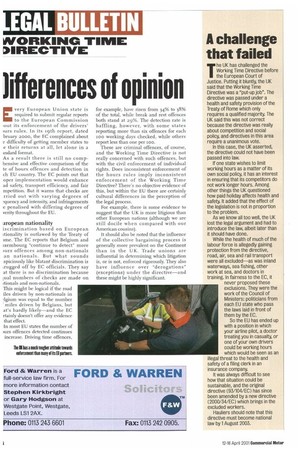A challenge that failed
Page 28

If you've noticed an error in this article please click here to report it so we can fix it.
The UK has challenged the Working Time Directive before the European Court of Justice. Putting it bluntly, the UK said that the Working Time Directive was a "put-up job". The directive was passed under a health and safety provision of the Treaty of Rome which only requires a qualified majority. The UK said this was not correct because the directive was really about competition and social policy, and directives in this area require a unanimous vote.
In this case, the UK asserted, the directive could not have been passed into law.
If one state wishes to limit working hours as a matter of its own social policy, it has an interest in ensuring that its competitors do not work longer hours. Among other things the UK questioned how paid holiday affects health and safety. It added that the effect of the legislation is not in proportion to the problem.
As we know all too well, the UK lost the legal argument and had to introduce the law, albeit later than it should have done.
While the health of much of the labour force is allegedly gaining protection from the directive, road, air, sea and rail transport were all excluded—as was inland waterways, sea fishing, other work at sea, and doctors in training. In fairness to the EC, it never proposed these exclusions. They were the work of the Council of Ministers: politicians from each EU state who pass the laws laid in front of them by the EC.
So the EU has ended up with a position in which your airline pilot, a doctor treating you in casualty, or one of your own drivers could be working hours which would be seen as an illegal threat to the health and safety of a filing clerk in an insurance company.
It was always difficult to see how that situation could be sustainable, and the original directive (93/104/EC) has since been amended by a new directive (2000/34/EC) which brings in the excluded workers.
Hauliers should note that this directive must become national law by 1 August 2003.
































































































